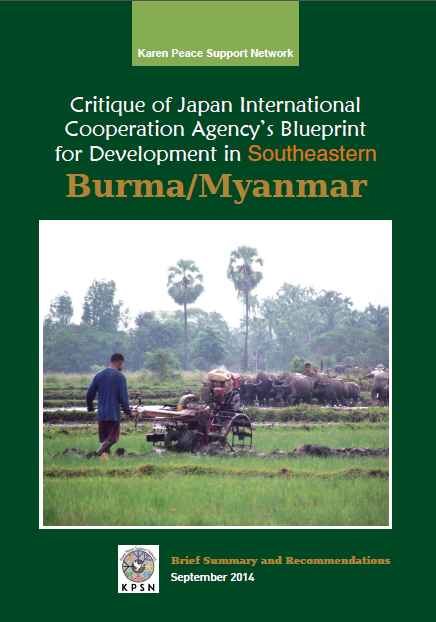Critique of Japan International Cooperation Agency’s Blueprint for Development in Southeastern Burma/Myanmar
By Karen Peace Support Network • September 12, 2014The Japan International Cooperation Agency (JICA) has recently issued a blueprint that proposes industrial development in Southeast Burma/Myanmar, purportedly to aid in the return and settlement of refugees and Internally Displaced Persons (IDPs) in Karen and Mon States. However, the Karen Peace Support Network (KPSN), a network of nearly 30 ethnic Karen organizations, cautions JICA that its blueprint for infrastructure development such as roads and industrial estates in the war-torn southeast is premature and flawed, potentially exacerbating conflict in the region.
The KPSN (formerly KCBPSN) is the largest network of Karen civil society organizations in Burma/Myanmar. These organizations have been providing support for vulnerable people in this conflict-torn region for decades, striving to empower local communities, build transparent and accountable institutions, and help create a sustainable peace in Burma/Myanmar. KPSN and its member organizations are important stakeholders which must be included in any development planning process in the Karen areas of the southeast.
The JICA blueprint is officially called the Preparatory Survey for the Integrated Regional Development for Ethnic Minorities in the South-East Myanmar: Final Report (October 2013). It is intended to guide Japanese investment in the southeast and focuses on upgrading and expanding road networks and establishing industrial estates, urban infrastructure, and industrial agriculture such as rubber plantations.
By working primarily with the central government and its appointed state governments in planning major development projects, JICA’s approach legitimizes and reinforces existing centralized government structures. The blueprint assumes that refugees and IDPs will voluntarily return when industrial development occurs, and it assumes that such development can be implemented in parallel with the peace process. However, KPSN’s own conflict analysis argues that these assumptions are wrong.
KPSN’s analysis shows that the exploitation of local natural resources and disrespect for land rights by central military authorities are two key causes of more than 60 years of conflict in ethnic areas of Burma/Myanmar. This should be understood within the larger context of the state’s denial of ethnic peoples’ demands for self-determination. The current peace process has not yet led to a meaningful decentralization of constitutional powers, whereby local ethnic peoples have a voice in government development policies. We are concerned that JICA’s blueprint neither sufficiently recognizes this risky context nor proposes people-centered development alternatives.
It is indeed dangerous to ignore the underlying causes of conflict in the region and to invest money or technical support without consulti ng communities or paying heed to their concerns. A development strategy lacking a strong foundation of sound information from diverse sources – including critical analysis – cannot possibly lead to sustainable development. A more likely outcome is increased conflict: if this JICA blueprint becomes a means to strengthen current centralized government structures while ignoring local ethnic participation, it will fuel the ongoing conflict rather than help support a sustainable peace.
A blueprint of this scope, concerning socio-economic development in the southeast, is the first of its kind. We welcome the efforts of the Japanese people and other international organizations to contribute to our communities, which have been struggling with oppression and dispossession for generations. But we have serious reservations concerning JICA’s blueprint, its processes, recommendations, and future consequences. Civil society organizations among the Karen and other ethnic communities have been providing support for vulnerable people in this conflict torn region for decades, yet JICA has held no meaningful consultations with our organizations.
Despite this fact and despite our strong reservations about the process to date, KPSN is willing to engage JICA under the assumption that Japan is approaching Southeast Burma/Myanmar with good intentions. However, after decades of failed and destructive development in the region, it is illegitimate for Japan to proceed with the same outdated and discredited processes […]
Download the full report in English Burmese here.
Tags: Burma Government, Democracy, Development, Environment, Human Rights, IDPs, Japan, Japan International Cooperation Agency, Karen Environmental and Social Action Network, Karen National Union, Karen Peace Support Network, Mon, Peace Process, Refugees, United Nationalities Federal CouncilThis post is in: Business and Human Rights, Environmental and Economic Justice, Spotlight
Related PostsLand Policies and Laws Must Reflect Rights and Interests of Vulnerable Communities
Yearning to be Heard: Mon Farmers’ Continued Struggle for Acknowledgement and Protection of their Rights
WORLD REPORT 2015
A Briefing by Burmese Rohingya Organization UK: International Investigation Urgently Needed into Human Rights Abuses Against the Rohingya
Burma: Stop Christian cross Removal; Drop Trumped-up Charges










 All posts
All posts